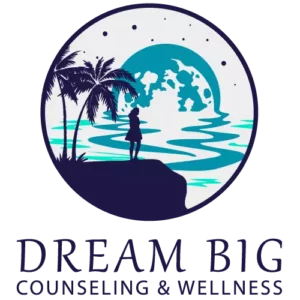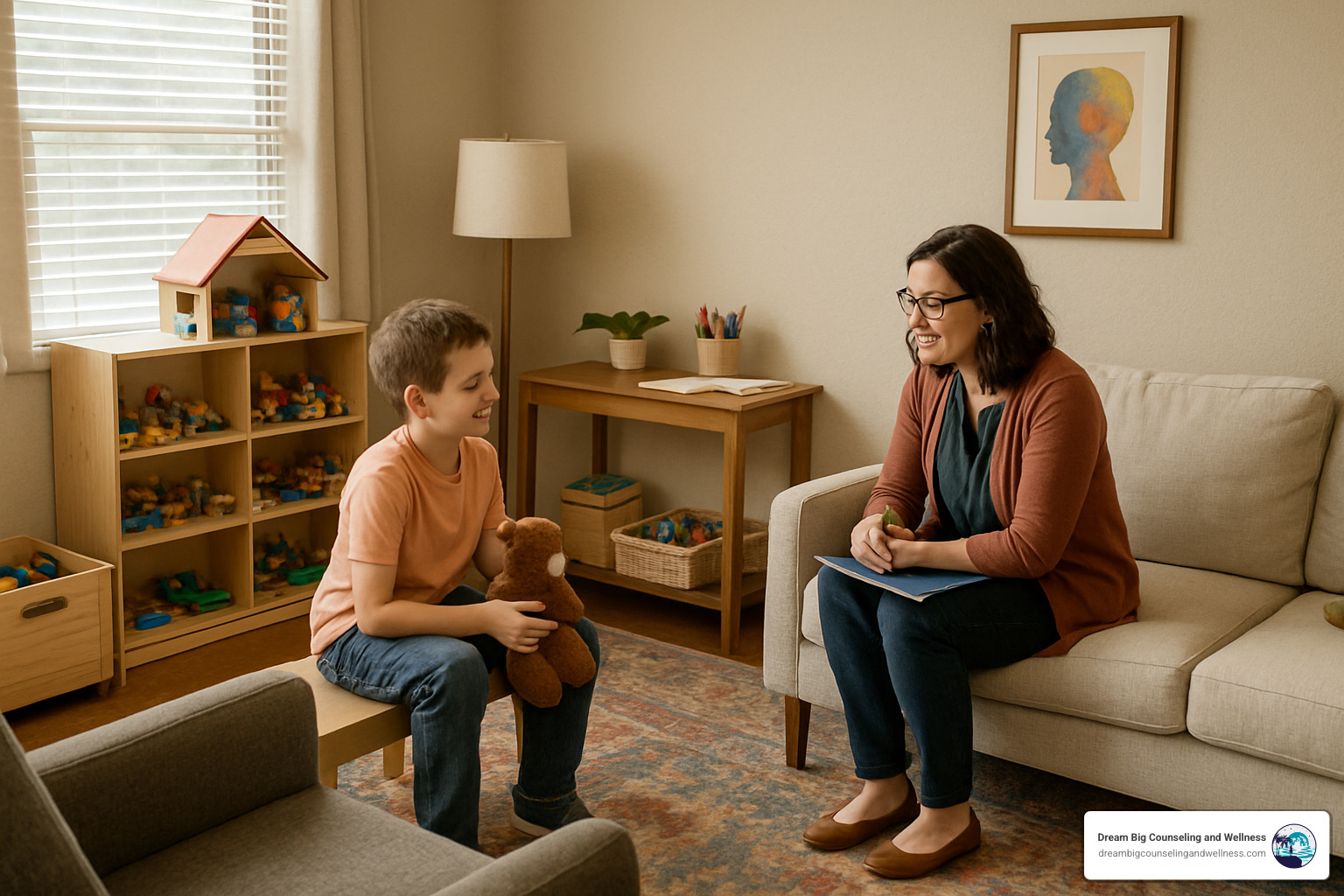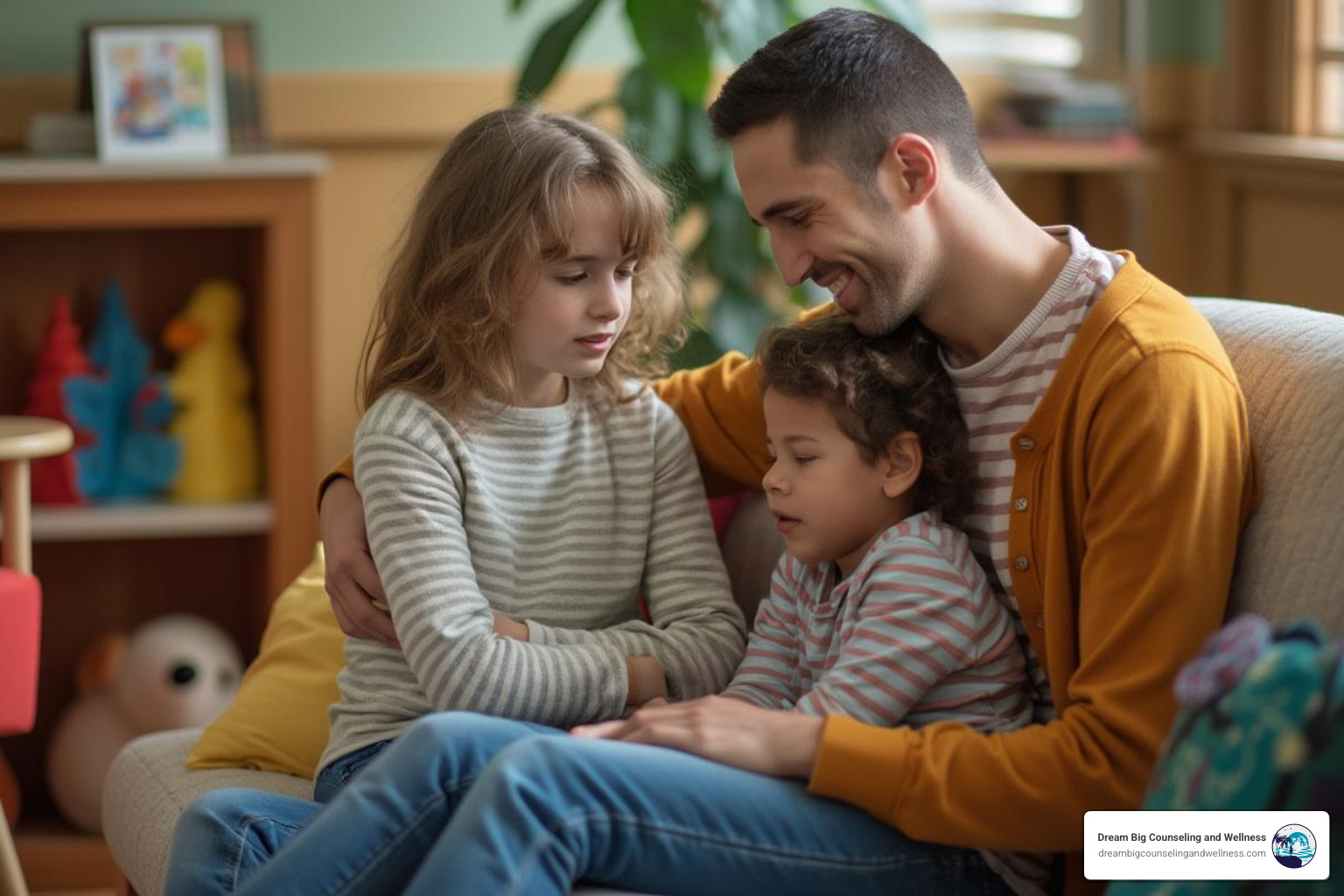Child Therapist Georgetown TX: Top 3 Best Experts 2025
Introduction to Child Therapy in Georgetown
Child therapy represents a specialized approach to counseling that nurtures children’s emotional, social, and behavioral development. In Georgetown, TX, families are discovering the transformative power of therapeutic support designed specifically for young minds. At Dream Big Counseling and Wellness, children, adolescents, and young adults receive individualized care that addresses their unique emotional needs while helping children learn essential coping skills for life’s challenges.
Child therapy differs significantly from adult counseling because children communicate and process emotions differently at various developmental stages. Young children often express their inner world through behavior rather than words, while teenagers and young adults may struggle with identity formation and peer relationships. This diversity in developmental needs requires a counselor who understands child psychology and can adapt therapeutic approaches to match each child’s specific communication style and emotional capacity.
Georgetown counseling services for children involve creating a compassionate space where they feel understood and accepted. Through evidence-based modalities like EMDR (Eye Movement Desensitization and Reprocessing), Cognitive-Behavioral Therapy, and Attachment Therapy, children learn to process difficult emotions, develop healthy coping skills, and build resilience. The goal isn’t just to address immediate concerns but to equip children with emotional tools they’ll use throughout their lives.
Family counseling involvement plays a crucial role in successful child therapy outcomes. When parents and caregivers understand their child’s therapeutic journey and learn supportive strategies, the healing process extends beyond the therapy room into daily life. This comprehensive approach to child and family counseling ensures that children receive consistent support across all environments, maximizing their potential for growth and emotional well-being.
Why Georgetown Families Choose Local Child Therapy Services
Georgetown counseling has become increasingly important as families recognize the value of professional mental health care for their children’s emotional development. The community’s growth and changing dynamics create both opportunities and challenges for young people, making accessible, quality counseling services more valuable than ever.
Local Advantages for Georgetown Families:
- Community Understanding: A solo therapist practicing Georgetown counseling understands the unique aspects of Central Texas life, from local school systems to community dynamics
- Insurance Accessibility: Dream Big Counseling and Wellness accepts major insurance plans including Aetna, Blue Cross Blue Shield, United Healthcare, Scott & White Health Plan, and Cigna, with out of network options available
- Comprehensive Age Range: Counseling services available for children, teens, adolescents, young adults, and adults, allowing families to receive care from one trusted provider
- Evidence-Based Approaches: Utilizes proven therapeutic modalities including EMDR, CBT, Solution-Focused Therapy, and Attachment Therapy
- Flexible Scheduling: Evening and weekend appointments accommodate busy family schedules
The benefits of choosing local Georgetown counseling extend beyond convenience. A counselor familiar with Georgetown-area schools, recreational programs, and community resources in Liberty Hill, Round Rock, Jarrell, and Cedar Park can provide more relevant, practical guidance. This local knowledge enables more effective collaboration with teachers, coaches, and other professionals in your child’s life when needed.
Research consistently shows that early intervention in children’s mental health leads to better long-term outcomes. Many children who receive appropriate therapeutic support develop stronger emotional regulation skills, improved relationships, and greater resilience when facing future challenges. The investment in your child’s emotional health today creates a foundation for lifelong well-being.
Understanding When Your Child May Benefit From Therapy
Children rarely express emotional distress in direct ways. Instead, they communicate through behavior, physical symptoms, and changes in their typical patterns. Recognizing these signs early allows families to seek support before small challenges become larger obstacles.
Behavioral and Emotional Indicators:
Academic and Social Changes:
- Sudden decline in school performance or motivation
- Difficulty concentrating or completing tasks
- Social withdrawal from friends or family
- Frequent conflicts with peers or authority figures
- School avoidance or resistance to attending
Emotional and Physical Symptoms:
- Intense mood swings or emotional outbursts
- Persistent sadness, worry, or fearfulness
- Frequent headaches or stomachaches without medical cause
- Sleep disturbances or changes in appetite
- Regression to younger behaviors indicating behavioral issues
Trauma-Related Responses:
- Nightmares or intrusive thoughts about past experiences
- Avoidance of places, people, or activities previously enjoyed
- Hypervigilance or startled responses to normal stimuli
- Difficulty discussing specific experiences or time periods
ADHD-Related Challenges:
- Inability to focus despite genuine effort
- Impulsive behaviors that interfere with relationships or safety
- Difficulty organizing tasks or following multi-step instructions
- Excessive restlessness in appropriate settings
Addiction-Related Concerns:
- Discovery of substance use or concerning behavioral patterns
- Lying about activities or whereabouts
- Dramatic personality changes or new peer groups
- Declining interest in previously important activities
Life Transitions and Adjustments:
- Difficulty adapting to divorce, remarriage, or family changes
- Challenges with moving to new schools or communities like Liberty Hill or Cedar Park
- Struggles with grief following loss of loved ones or pets
- Behavioral issues during major life adjustments
Remember that children’s emotional needs vary significantly based on their developmental stage, personality, and life experiences. What appears concerning for one child might be typical behavior for another. A qualified family therapist can help distinguish between normal developmental challenges and situations requiring professional intervention.
Therapeutic Approaches: Personalized Care for Every Child
Dream Big Counseling and Wellness recognizes that effective child therapy requires matching therapeutic approaches to each child’s unique situation, personality, and circumstances. No single modality works for every child, which is why therapists specialize in multiple evidence-based approaches, often combining techniques to create a personalized treatment plan for new clients and existing families.
EMDR (Eye Movement Desensitization and Reprocessing)
Eye Movement Desensitization and Reprocessing proves particularly effective for children who have experienced trauma, whether from single incidents or ongoing stressful situations. This approach helps children process difficult memories in a way that reduces their emotional impact and allows healing to occur naturally.
For children, Eye Movement Desensitization sessions are adapted to be age-appropriate and engaging. Younger children might use “butterfly hugs” or other bilateral movements, while teenagers and young adults can engage with the standard protocol. The technique helps children’s brains process traumatic memories more effectively, reducing symptoms like nightmares, flashbacks, or intrusive thoughts.
Many children respond quickly to EMDR, sometimes showing improvement after just a few therapy sessions. The approach doesn’t require children to talk extensively about their trauma, making it particularly suitable for those who struggle to verbalize their past experiences.
Cognitive-Behavioral Therapy (CBT)
CBT teaches children practical tools for managing anxiety, depression, and behavioral challenges. This therapeutic approach helps children understand the connection between their thoughts, feelings, and behaviors, empowering them to make positive changes in their daily life.
For younger children, CBT concepts are presented through stories, games, and activities that make abstract ideas concrete and understandable. Adolescents and young adults can engage with more sophisticated CBT techniques, learning to identify thought patterns and develop healthy coping skills they can use independently.
CBT skills are particularly valuable because children can apply them in various situations throughout their lives. Whether dealing with test anxiety, friendship conflicts, or family stress, the tools learned in CBT therapy sessions provide lasting benefits and support self esteem.
Solution-Focused Therapy
This therapeutic approach emphasizes children’s existing strengths and resources while working toward specific, achievable goals. Rather than focusing extensively on problems, Solution-Focused Therapy helps children identify what’s already working in their lives and build upon those successes.
Children often respond well to this positive, future-oriented approach because it recognizes their capabilities and potential. Therapy sessions focus on small, manageable changes that lead to larger improvements over time, helping children learn effective problem-solving strategies.
Attachment Therapy
Attachment Therapy addresses the fundamental relationships in children’s lives, particularly the parent-child bond. This approach is especially beneficial for children who have experienced disrupted relationships, adoption, foster care, or other attachment challenges affecting family dynamics.
The therapy helps children develop secure attachment patterns that support healthy relationships throughout their lives. Parents often participate in sessions to learn attachment-promoting strategies and strengthen their connection with their child, addressing relationship issues within the family system.
Somatic Therapy
Children often experience emotions and trauma through their bodies before they can articulate feelings verbally. Somatic Therapy helps children recognize physical sensations associated with emotions and learn body-based techniques for self-regulation.
This approach is particularly valuable for children who struggle with emotional regulation, anxiety, or trauma responses. Children learn to notice physical cues like muscle tension or rapid heartbeat and develop strategies to calm their nervous system, supporting their overall mental health.
Safe & Sound Protocol (SSP)
SSP is an innovative approach that helps regulate the nervous system through specifically designed music listening experiences. This intervention can be particularly helpful for children with anxiety, attention challenges, or trauma responses.
The protocol supports the development of better emotional regulation and social engagement skills. Many children find SSP enjoyable while experiencing real neurological benefits that support their overall therapeutic progress and self discovery.
Reunification Therapy
This specialized approach helps families rebuild healthy relationships after separation, divorce, or other family disruptions. Reunification Therapy provides a structured process for reestablishing healthy parent-child connections when relationships have become strained or interrupted.
The therapy focuses on gradual relationship rebuilding, addressing barriers to connection, and developing healthy communication patterns within the family system, helping to resolve ongoing relationship issues.
Marriage and Couples Counseling
For families where parental relationship issues impact children’s well-being, marriage counseling services are available. When parents work through their own relationship challenges, it creates a more stable, supportive environment for children’s emotional development.
What to Expect: Your Child’s Therapeutic Journey
Beginning therapy represents a significant step for families, and understanding the process helps reduce anxiety while setting realistic expectations. At Dream Big Counseling and Wellness, the therapeutic journey is carefully designed to prioritize your child’s comfort and progress.
Initial Assessment and Planning
The first session focuses on understanding your child’s unique situation, strengths, and challenges. This comprehensive assessment includes:
- Family and developmental history
- Current concerns and goals
- Previous therapeutic experiences, if any
- Child’s interests, strengths, and preferred communication styles
- Family dynamics and support systems
During this first session, your child will have opportunities to explore the therapeutic space and begin building rapport with their counselor. The environment is designed to feel welcoming and safe, recognizing that comfort level significantly impacts therapeutic effectiveness for new clients.
Treatment Planning and Goal Setting
Based on the initial assessment, a personalized treatment plan is developed collaboratively with family input. Goals are established that are:
- Specific and measurable
- Age-appropriate and realistic
- Meaningful to both child and family
- Focused on building lasting skills
Treatment plans remain flexible, adapting as your child progresses and circumstances change. Regular review ensures that therapy continues meeting your child’s evolving needs and helps support children through various life transitions.
Session Structure and Frequency
Most children benefit from weekly therapy sessions, though frequency may vary based on individual needs and circumstances. Sessions typically last 50-60 minutes and are structured to maximize engagement and therapeutic benefit.
For younger children, sessions often incorporate movement, creative activities, and interactive techniques that maintain attention while addressing therapeutic goals. Adolescents and young adults may engage in more traditional talk therapy combined with skill-building exercises and real-life application of therapeutic concepts.
Family Involvement and Support
Family counseling participation enhances therapeutic outcomes significantly. Depending on your child’s age and specific needs, family involvement might include:
- Regular check-ins with parents about progress and strategies
- Family therapy sessions to address relationship dynamics
- Parent education about supporting therapeutic goals at home
- Coordination with schools or other professionals when beneficial
Progress Monitoring and Adjustment
Therapeutic progress is monitored through various methods:
- Regular assessment of symptoms and functioning
- Feedback from child, parents, and teachers when appropriate
- Observation of child’s behavior changes and skill development
- Achievement of established therapeutic goals
Treatment plans are adjusted as needed to ensure continued progress and address emerging needs. This flexibility ensures that counseling services remain relevant and effective throughout your child’s development.
Supporting Your Child’s Mental Health: A Community Approach
Mental health care extends beyond individual therapy sessions. Georgetown families benefit from understanding how to create supportive environments at home, school, and in the community that reinforce therapeutic progress and support children through various life adjustments.
Creating a Supportive Home Environment
Communication Strategies:
- Practice active listening without immediately offering solutions
- Validate your child’s emotions while helping children learn coping skills
- Establish regular family time for connection and communication
- Model healthy emotional expression and stress management
Routine and Structure:
- Maintain consistent daily routines that provide security
- Create calm spaces in your home where children can retreat when overwhelmed
- Establish clear, reasonable expectations and consequences
- Balance structure with flexibility for individual needs
Promoting Emotional Intelligence:
- Help children identify and name their emotions
- Discuss healthy ways to express different feelings
- Read books or watch movies that explore emotional themes
- Practice problem-solving together for age-appropriate challenges
School Collaboration and Support
When appropriate and with proper permissions, collaboration between your family therapist and school can significantly benefit children’s progress. This might include:
- Communication about strategies that work in therapeutic settings
- Guidance for teachers about supporting specific needs
- Coordination around academic accommodations when relevant
- Support during school transitions or challenging periods
Building Resilience and Life Skills
Counseling services provide a foundation for lifelong emotional health, but children also benefit from ongoing skill development:
Stress Management:
- Teaching age-appropriate relaxation techniques
- Encouraging physical activity and outdoor time
- Promoting creative outlets for emotional expression
- Building time management and organizational skills
Social Skills Development:
- Practicing conversation and friendship skills
- Learning conflict resolution strategies
- Developing empathy and perspective-taking abilities
- Building confidence in social situations and self esteem
Academic and Personal Growth:
- Supporting goal-setting and achievement
- Encouraging curiosity and learning
- Building problem-solving capabilities
- Fostering independence appropriate to developmental stage
Addressing Specific Mental Health Concerns
Dream Big Counseling and Wellness provides specialized support for various mental health challenges that commonly affect children, adolescents, and young adults in the Georgetown area.
Trauma Recovery
Trauma affects children differently depending on their age, the nature of the traumatic experience, and their support systems. Symptoms might include:
- Re-experiencing trauma through nightmares or flashbacks
- Avoidance of trauma reminders
- Changes in mood, behavior, or academic performance
- Physical symptoms like headaches or stomachaches
- Difficulty concentrating or sleeping
Treatment approaches are carefully selected based on the child’s specific trauma history and current symptoms. EMDR, Attachment Therapy, and Somatic Therapy are often particularly effective for trauma recovery, helping children process difficult past experiences while building resilience and coping skills.
Anxiety Management
Anxiety in children can manifest in various ways, from school refusal to physical symptoms to social withdrawal. Effective anxiety treatment helps children:
- Understand the connection between thoughts, feelings, and physical sensations
- Develop practical coping strategies for anxious moments
- Gradually face feared situations with support and confidence
- Build overall emotional regulation skills
CBT techniques are often highly effective for childhood anxiety, providing children with concrete tools they can use independently. Somatic Therapy and SSP may also support anxiety management by helping regulate the nervous system and reduce stress.
Depression Support
Childhood depression requires careful assessment and treatment, as symptoms can be easily misunderstood or overlooked. Treatment focuses on:
- Identifying and addressing underlying factors contributing to depression
- Building positive coping strategies and emotional expression skills
- Strengthening family relationships and support systems
- Developing hope and motivation for positive change
ADHD Management
While therapy doesn’t replace medical treatment for ADHD, therapeutic support can be invaluable for developing organizational skills, emotional regulation, and social competencies. Children with ADHD benefit from:
- Learning practical strategies for attention and focus
- Developing organizational and time management skills
- Building self esteem and confidence
- Addressing any co-occurring emotional or behavioral challenges
Addiction Prevention and Recovery
For adolescents and young adults struggling with substance use or concerning behaviors, early intervention can prevent more serious problems. Treatment addresses:
- Understanding underlying factors contributing to substance use
- Developing healthy coping strategies for stress and emotions
- Building positive relationships and social connections
- Creating meaningful goals and activities that support recovery
Grief and Loss Support
Many children experience grief following the death of loved ones, pets, or other significant losses. Grief counseling helps children:
- Process complex emotions associated with loss
- Develop healthy ways to remember and honor what was lost
- Build coping skills for managing grief-related symptoms
- Navigate life transitions following significant losses
Making Therapy Accessible: Insurance and Practical Considerations
Dream Big Counseling and Wellness is committed to making quality mental health care accessible to Georgetown families. Understanding insurance benefits and practical aspects of therapy helps families make informed decisions about their child’s care.
Insurance Coverage and Benefits
The practice accepts several major insurance plans:
- Aetna
- Blue Cross Blue Shield
- United Healthcare
- Scott & White Health Plan
- Cigna
Insurance coverage for mental health services has improved significantly in recent years, with most plans providing meaningful benefits for therapy. However, coverage details vary by specific plan and policy. The practice provides assistance with:
- Verifying insurance benefits before beginning therapy
- Understanding deductibles, copayments, and coverage limits
- Submitting claims and handling insurance communications
- Exploring out of network options when insurance coverage is limited
Scheduling and Accessibility
Recognizing that families have diverse scheduling needs, Georgetown counseling services offer:
- Evening appointments to accommodate school and work schedules
- Weekend availability for families who cannot attend during weekdays
- Online therapy sessions throughout Texas for times when in-person meetings aren’t practical
- Flexible scheduling to accommodate changing family needs
Location and Convenience
Dream Big Counseling and Wellness serves clients throughout the Georgetown area, including Round Rock, Jarrell, Liberty Hill, and Cedar Park. The centrally located practice provides convenient access for families across Central Texas.
Online therapy options expand accessibility further, allowing families to access quality care regardless of location within Texas. This flexibility proves particularly valuable for:
- Families with transportation challenges
- Times when illness or weather makes travel difficult
- Adolescents and young adults who may feel more comfortable in familiar environments
- Maintaining therapeutic continuity during travel or transitions
Taking the First Step: Beginning Your Child’s Therapeutic Journey
Deciding to seek therapy for your child represents a significant step toward supporting their emotional health and future well-being. Understanding what to expect and how to prepare can make this process smoother for everyone involved.
Preparing Your Child for Therapy
Age-Appropriate Explanations:
For younger children (ages 3-8):
- “We’re going to visit someone who helps children with their feelings”
- “This person has special games and activities to help you feel better”
- “It’s like going to the doctor, but for feelings instead of your body”
For school-age children and adolescents (ages 9-15):
- “Therapy is a place where you can talk about anything that’s bothering you”
- “The counselor is trained to help kids figure out solutions to problems”
- “Many children go to therapy – it’s a normal way to get help when you need it”
For teenagers and young adults (ages 16+):
- “Therapy provides a private space to talk about whatever is on your mind”
- “The counselor is there to listen and help you develop your own solutions”
- “Everything you discuss is confidential unless there are safety concerns”
Addressing Common Concerns
“My child doesn’t want to go to therapy” Resistance is normal and understandable. Children may worry about:
- Being judged or misunderstood
- Having to discuss painful experiences
- Not knowing what to expect
- Feeling different from other children
Address these concerns by:
- Acknowledging their feelings as valid
- Explaining therapy in simple, reassuring terms
- Emphasizing that therapy is about feeling better, not being “fixed”
- Allowing them to ask questions about the process
“Will therapy really help my child?” Research consistently demonstrates that counseling services can be highly effective for children when:
- The therapeutic approach matches the child’s needs
- There’s a good fit between child and counselor
- Family members support the therapeutic process
- Treatment continues long enough to create lasting change
Most children begin showing improvement within the first few months of consistent therapy, with continued progress over time.
Setting Realistic Expectations
Timeline for Progress:
- Initial rapport building: 2-4 sessions
- Skill development and implementation: 6-12 sessions
- Significant symptom improvement: 3-6 months
- Long-term skill consolidation: 6-12 months
These timelines vary significantly based on individual circumstances, including:
- The nature and severity of presenting concerns
- Your child’s age and developmental stage
- Family support and involvement
- Concurrent stressors or life changes
Supporting Ongoing Progress
Between Sessions:
- Practice skills and strategies discussed in therapy
- Maintain open communication about your child’s experiences
- Notice and acknowledge positive changes, no matter how small
- Contact the counselor if concerns arise between sessions
Long-term Success:
- Continue using therapeutic skills even after formal therapy ends
- Maintain awareness of your child’s emotional needs as they develop
- Know that returning to therapy during challenging periods is normal and healthy
- Remember that investing in your child’s emotional health provides lifelong benefits
Conclusion: Investing in Your Child’s Future
Choosing Georgetown counseling for your child represents one of the most meaningful investments you can make in their future happiness and success. Children, adolescents, and young adults who develop strong emotional regulation skills, healthy coping strategies, and secure relationships carry these benefits throughout their entire lives.
Georgetown’s growing community presents both opportunities and challenges for families. While the area offers excellent schools, recreational activities, and family-friendly environments in communities like Liberty Hill, Round Rock, Jarrell, and Cedar Park, children still face universal challenges like academic pressure, social dynamics, family changes, and personal struggles. Professional therapeutic support helps children navigate these challenges while building resilience and confidence.
Dream Big Counseling and Wellness understands that every child’s situation is unique. The practice’s comprehensive approach, utilizing evidence-based modalities like EMDR, CBT, Solution-Focused Therapy, Attachment Therapy, Somatic Therapy, Reunification Therapy, and Safe & Sound Protocol, ensures that each child receives care tailored to their specific needs and circumstances.
The therapeutic relationship between your child and their counselor forms the foundation for meaningful change. In a compassionate space, children learn that their thoughts and feelings matter, that challenges can be overcome, and that asking for help demonstrates strength rather than weakness.
Family counseling involvement enhances therapeutic outcomes significantly. When parents understand their child’s therapeutic journey and learn supportive strategies, the benefits extend far beyond the therapy room. Families develop stronger communication patterns, deeper connections, and more effective problem-solving skills together.
The decision to seek therapy often comes during difficult times, but it leads to hope and positive change. Children who receive appropriate therapeutic support develop emotional intelligence, healthy relationships, and the confidence to face future challenges. These skills serve them well in academics, friendships, family relationships, and eventually in their careers and adult relationships.
Insurance coverage through major providers including Aetna, Blue Cross Blue Shield, United Healthcare, Scott & White Health Plan, and Cigna makes quality child and family counseling accessible for most Georgetown families. Flexible scheduling options and online therapy availability ensure that practical barriers don’t prevent children from receiving the support they need.
Remember that seeking help for your child demonstrates wisdom and love. Every child deserves the opportunity to develop their full potential, and therapeutic support provides the tools and guidance necessary for this growth. The investment you make in your child’s emotional health today creates a foundation for lifelong well-being and success.
Whether your child is experiencing anxiety about school transitions, processing difficult life experiences, developing better emotional regulation skills, or working through behavioral issues, professional support can make a meaningful difference. Georgetown counseling services, exemplified by practices like Dream Big Counseling and Wellness, stand ready to support your family’s journey toward healing and growth.
Taking the first step toward therapy requires courage, but it opens the door to possibilities for positive change that extend far beyond childhood. Your child’s emotional health matters, and professional support can help them develop the skills and confidence they need to thrive throughout their lives.
For more information about how Dream Big Counseling and Wellness can support your child and family through beginning therapy and beyond, reach out to discuss your specific needs and begin the journey toward emotional wellness and resilience.





